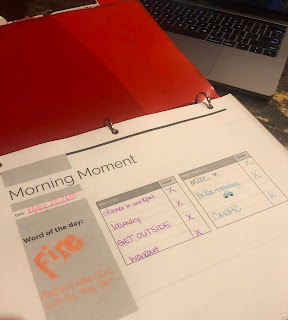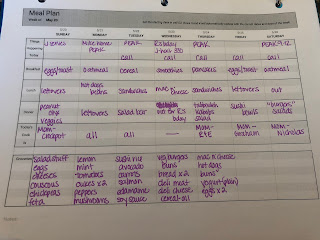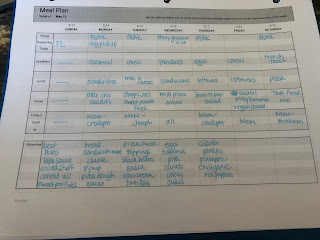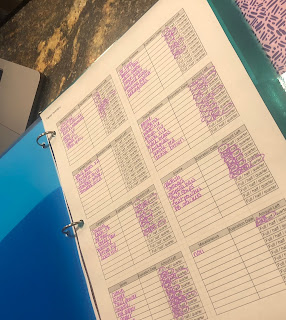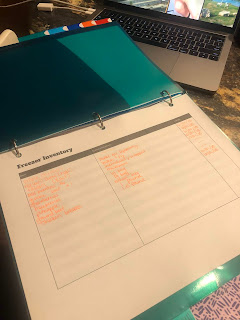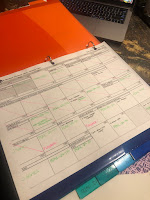As you guys know, we recently spent A LOT of time on the road. Between gymnastics competitions, work trips, and vacations, we basically spent all of April and all of May traveling. It was an amazing two months. It wasn’t perfect - there were definitely some stresses and down moments, but it was amazing all of the same.
I was really worried, going into this season of traveling, about somehow undoing all of the hard work I’d done with losing weight over the last 7 months. I mean, that’s typically been my MO. Work hard, diet and focus on losing weight for some event or goal, and then once we get to that event or goal? I totally stop caring and just let myself go wild. I’d worked so hard since last October, though, and I wasn’t at my weight loss goal yet, and I really didn’t want to have a huge setback and have to lose that same weight for a second time. Been there, done that.
I didn’t do it. I ended up maintaining - even losing 1/2 a pound, overall! - during the whole time we were on the road and traveling. I mean, sure, while I was actually sitting in a Florida condo, drinking bushwhackers and hurricanes, I did go up a little bit. But by the time I’d gotten back home, those extra couple of pounds were gone again, and I hadn’t gained back any of those pesky pounds that I’d worked so hard to lose before the months o’travel.
Because I kept notes on the regular (what can I say, I’m a bit obsessive about some things), I was able to sit down and punch out this recap for you guys. I definitely learned a lot about trying to maintain healthy habits while so many things are out of your control, and the pressure to do otherwise is at an all-time high.
The first thing I learned and the most important?
This is a marathon, not a sprint.
The goal is to develop - and maintain - healthy HABITS. Not healthy excursions. Not healthy instances. Healthy HABITS. We are looking at this with the long-term picture in mind, right, friends? Each trip or vacation or cookout or party or event that you participate in this summer is a learning tool: a chance to move closer to the finish line of living a life full of healthy habits. With each trip or vacation, I got a little bit wiser about taking care of myself. I learned just a little bit more about what was in the food I was eating, and how to better control it, instead of it controlling me, with every mile that we traveled over the last two months. So, important tip number one? Well, really, the take home message. I’m not numbering this one - it’s that important. If you get only one thing from this blog post, I want it to be this: We are running a marathon toward a life of healthy habits, not a 100m dash.
But from a practical point of view? How can you better set yourself up for success along the way, when life isn’t following your “normal routine?”
Here’s what I learned:
1). Pack your own snacks. Even if you’re flying, pack your own snacks. Most things you can put in your carryon luggage, and then pull out once you’re on the plane. Just make sure to look at your airline’s website first and see if there are any restrictions as to what can be brought onto the plane. Friends of mine often bring protein bars, or travel-friendly fresh fruit (think apples, not bananas!), or shelf-stable protein shakes, and they drink them over cups of ice in the terminal. We drove for all of our traveling this past bit, so it was definitely easier to bring our own snacks. Now, everyone’s goals for building healthy habits with food are different, but for us, those snacks relied heavily on fresh fruit and veggies, hummus, hardboiled eggs, cheese sticks, and nuts.
 |
| A freezer meal: frozen, pre-made burritos that could be microwaved, and bagged salad |
3). If you have a room with a kitchen, or at least a full fridge/freezer and a microwave (there are some economical suites brands that don’t give you a full kitchen, but they do give you more room and a full fridge/freezer combo, and a microwave. We’ve done those before, too), you can prepare for eating in the hotel by making freezer meals before you leave home. I do this with every long trip that we’re on - mostly to control costs, but it also helped me feel in control of my diet while we were on the road. Simple freezer meals, like chili, veggie burgers, individual quiche, bbq chicken or pork, lentil curries and rice, and individual burritos make great on-the-road options. They’re all completely pre-cooked when you make and freeze them, and require nothing more than a microwave to reheat and enjoy in a hotel room. I freeze everything as solidly as possible before we leave home, and then use these things to keep items cool in a cooler while we’re driving. Usually, by the time we get to the hotel, only the one on top has thawed at all, and everything else is still frozen solid. I move the frozen things to the hotel freezer to keep overnight, and use the thawed (or partially thawed) item as our dinner that night. Bring a stash of paper plates, napkins, and utensils, and you won’t even have to rely on the hotel housekeeping service to start making your food.
 |
| Don't forget your water! |
4). Pack picnic lunches! Even if it’s winter, we will do this and stop at roadside service centers and welcome centers to actually eat. It’s obviously easier in the summer to have a roadside picnic, but it’s not impossible in the winter. We pack sandwich fixings, fresh fruit (usually clementines and apples, because those are crowd favorites), nuts and cheese, yogurt (gogurt tubes freeze wonderfully and also help keep the cooler nice and cold!). We use either tortillas or pita bread for making the sandwiches, so that we don’t have to worry about smushed bread. Super easy, MUCH cheaper than eating out for every meal, and once again…..you are in complete control of your food options.
5). Water, water, water. This is so important, that I probably should have listed it as number one. No matter how much food you are able to control while on the road or flying (especially flying!!), your body is going to need you to stay hydrated. If you eat out at all, the salt content will be higher than your own homemade food, and you’ll likely not be moving as much. You’ll want that water to keep you feeling less bloated, and if I may be a little indelicate for a moment, you’ll want the water to keep things moving in your body. We each have our own little water bottle that keeps things nice and cold, and we refill it at every stop.
6). Friends, use those phone apps! We have become reliant on restaurants with phone apps just to keep our own sanity (I’m pretty sure standing in line at a fast food restaurant is a circle of Hell for parents). We would order our food “to go”, and then sit right there at the restaurant (typically outside if they have outdoor seating) and eat it. I cannot tell you how wonderful it is to walk into a restaurant with six kids, walk right to the counter, past everyone in line, pick up our to-go bag, and then go sit down and feed our hungry, cranky kids. I’m relatively certain they’re happy we’re not waiting in line and are able to feed our kids right away, too. What I didn’t realize until these past few months of travel was this: a lot of those apps have the nutritional info (including macros!) loaded right into the ordering function of the app. Some of them, (Panera, I’m looking at you) will update the nutritional information *in real time* as you customize your meal. It’s a dream come true for someone who is trying to maintain healthy habits and has no idea what will fit those goals at restaurants! As I ordered ahead for our meals, I was able to customize my meal to fit my macro goal for the day, and be confidant in my food choices. With these apps and Google Maps to help me find one of the restaurants I had an app for, each meal was totally in my control, and could be made to fit *my goals*. The apps that we used most often were: Panera, Chipotle, Chick-fil-a, and Noodles &Company, but even places like McDonalds had customizable menu-building options (with self-adjusting nutritional information) available through either their app or their website.
7). Skip hotel breakfast. I know, I know, it’s “included” in the cost of your stay. I get it. You’ve “already paid for it.” I don’t care. Step away from the hotel breakfast. I was shocked at how horrible the common breakfast options were when I’d look them up on My Fitness Pal…usually after eating them, and then I’d be trying to make up for it all day long. Breakfast is EASY to make in a hotel, especially if you’re in a hotel room with a full, or even a partial, kitchen. We prepped and packed a few things for breakfast, following the same philosophy as the freezer meals before. Our favorites were individual quiche, smoothie kits (take 1/2 cup of greek yogurt and freeze it in a cupcake liner. Once frozen, peal the liner off and throw it into a ziplock bag with frozen fruit. Throw the kits into a large gallon bag, and keep it in your cooler. Bring your smoothie maker or blender with you, and all you’ll need to add is some water (or milk/nut milk), and you’ll have an easy breakfast that you can control and customize), instant oatmeal, and high-protein bagels and breads with nut butters. We usually just ran down to the breakfast nook for nut butters and honey to eat with the bagels/breads. Not only were we able to start the day on track to hit our macro goals, but we felt better (does anyone else feel “greasy” and bloated after a hotel breakfast, or is that just me?). As a huge plus….our kids were happier and it was MUCH easier to feed them all when we were not trying to corral them into a hotel breakfast nook with too-small tables, high chairs with broken buckles, and hotel guests that stared at us like we were a circus side show.
8). Keep active. Even if you’re flying, you can keep moving when not actually in transit. Walk laps at the airport. I know all that you want to do after sitting all day is sit some more, but just do it. You’ll feel better physically, be more energized, and mentally refreshed. If driving (like us), use those frequent stops (we stop a lot - every couple of hours to make kids pee, refresh snacks and waters, and let the kids run around) to get some movement in yourself. I’ll run around with the little ones, playing tag, but also bring things like balls, jump ropes, and frisbees. Walk laps around rest stops, play a game of catch, jump some rope, or even engage the kids (if you have them with you) in a quick obstacle course of walking on sidewalk cracks, doing squats, or jumping jacks. The kids will love it, and you'll all feel so much better! Just keep the blood pumping any time that you can.
9). Remember to factor in a little wiggle room, in case things don’t go as planned. On our last trip, we had a couple of instances where traffic jams caused us to be arriving to our hotel too late to make one of our freezer meals, and ended up having to eat on the road. With the help of online nutritional info, and the buffer that I’d built into my day, I was able to still eat within my goals. Personally, I always leave enough room in my macros to have a good snack and/or a drink at the end of the day in the hotel. Then, if I have to change my plans for eating for the day, I’ve got a lot of room left just by skipping that bedtime snack and drink. If things go as planned? I get a tasty little snack after a long day on the road. It’s a win-win. Plan your day as best you can, but leave a little bit of wiggle room for changes. Keeping snacks on hand will help you fill in any gaps that you end up with if your plans DON’T change as you travel.
 |
| One spectacularly "off" day along our drive through Canada |
10). Last but not least, give yourself grace. Do not obsess so much over traveling that you lose the fun and the enjoyment of the journey. Remember, this is a marathon, NOT a sprint. If things don’t go as planned (because they often won’t), shake it off, and learn from it. On one of our trips, I was driving back from Maine on my own with the 6 kids. I decided to drive through Canada, because it was much quicker, and didn’t go refill my snack stash before leaving Maine. I’d driven through Canada countless times before (I have family there, so going to Canada is a regular occurance) and thought that I’d be fine with food options as we drove along the way. I was very wrong - I was fine until the last leg of the trip. There were NO food options. Not even a Tim Horton’s! (gasp!). Nothing at all, so we ended up eating gas station gourmet for a huge part of that trip. I was way off on my macros, and ended up bloated and up on the scale by the time I got home. I was disappointed, yes. But I wouldn’t let myself look at that last trip as a failure, even though I was up NINE (yes NINE) pounds by the time I got home. Why? Because I learned from it. On the next road trip, I made sure to have fully stocked snack bags and a fully stocked cooler, so that I didn’t have to rely on what I could find along the road. I learned about the importance of drinking water, not coffee, if I was unable to eat anything other than options on the road, for whatever reason. That “mistake” was something that helped me build a more successful trip, a few weeks later, when we went to Florida. Give yourself the grace that you deserve: you’re working on changing your LIFE, and there will be ups and downs along the way. Focus on not getting so stuck in the downs that you can’t make it to the next up.
*****
So there you have it, friends.
Flexible dieting while on the road, or, maybe more appropriately:
"What I learned on my spring vacations"
Remember your goals, remember your water, and remember that it's all about consistency. Use each choice as a learning opportunity, so you can build the habits that will lead to a healthy future!
*****
What tips would you add to my list?







